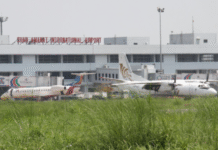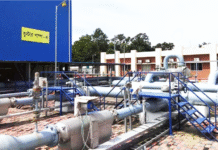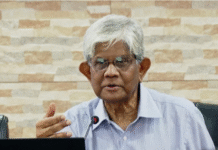Analysts speak at budget discussion

From right, Rokia Afzal Rahman, president of the Metropolitan Chamber of Commerce and Industry (MCCI); Dilip Barua, industries minister; Zaidi Sattar, chairman of Policy Research Institute of Bangladesh (PRI); SA Samad, executive chairman of Board of Investment; and Osman Farruk, former education minister, attend a discussion on the national budget, organised by the MCCI and PRI in Dhaka yesterday.
A leading chamber yesterday identified a stable political environment and smooth implementation of projects as crucial factors for attaining the 7.2 percent GDP growth rate desired by the government in fiscal 2013-14.
Given the upcoming budget would be implemented by three successive governments, a strong form of continuity is needed to achieve the GDP growth rate projected in the proposed budget, said Rokia Afzal Rahman, president of the Metropolitan Chamber of Commerce and Industry (MCCI).
“Given the uncertainties, political stability and proper implementation of the projects would be vital,” she said, while calling for close coordination between the fiscal policy and the monetary policy to attain the macroeconomic objectives of the government.
Her comments came at a discussion on the budget for the upcoming fiscal year, jointly organised by the MCCI and Policy Research Institute of Bangladesh (PRI) at the conference room of the chamber in Dhaka.
The MCCI chief lauded the finance minister for keeping the government’s bank borrowing target low.
“But, if the actual borrowing exceeds the budget amount, it could result in crowding out of private investment, which may lead to liquidity problems and raise interest rates.”
The entrepreneur, however, expressed disappointment over the continued scope to gain amnesty for black money via investment in certain sectors.
“We think such provisions will discourage honest taxpayers from paying taxes and may generate more black money in the system.”
SA Samad, executive chairman of Board of Investment, expressed disappointment at the parliament’s control over the fiscal policies.
“It is very unfortunate. Sometimes, the lawmakers do not know how much expenditure they are authorising the government to spend. This has to end.”
Former Finance Secretary Siddiqur Rahman said the government’s good performance in revenue collection in the last four years does not match its expenditure management.
He said a number of projects in transport and power sectors were identified for supporting the economic growth before the government took office four years ago, but they are yet to be realised.
Rahman cited the Dhaka-Chittagong highway project, which was approved in 2006 but only 31 to 32 percent of it has been implemented so far. “Is there any other project more important than this in the country?”
PRI Executive Director Ahsan H Mansur said the budget aims to moderately expand the size of the government but in a manner consistent with macroeconomic stability.
He, however, is sceptical about the GDP growth target being met given the underlying political and economic environment as well as the infrastructure gaps and governance issues, which would not support the corresponding higher level of investment.
The economist, however, rebuffed claims that the budget was largely aimed at the national polls, due early next year.
“On the one hand, this budget cannot be termed as an election year budget as it does not allow for any additional fiscal stimulus than in any normal year’s budget. Besides, in many instances social infrastructure spending is budgeted to decline in relative terms.”
“On the other hand, it allows for large wage increases for the public sector employees, clearly keeping in mind the election cycle.”
He expressed his disappointment over the missed opportunities to improve the tariff regime and the efficiency of resource allocation, via the budget.
“Because of the prohibitive nature of the tariff and para-tariff regimes, the National Board of Revenue is losing revenues, resources are being misallocated to inefficient industries and there is a significant loss in consumer welfare.”
Continuation of this strategy will certainly not help diversify the export base and promote growth, Mansur added.
The PRI executive director said the shortfalls in GDP growth compared to targets in recent years are virtually mirror images of the shortfalls in private sector investment relative to its targets.
Despite the slowdown and political tensions, the economist tips the country’s macroeconomic outlook to remain stable as the economy would be supported by strong external sector performance.
He said the government’s inflation target for next fiscal year is attainable but would require cautious management.
Hassan Zaman, chief economist of Bangladesh Bank, said although the strong growth in remittance inflow — now at 16 percent which is higher than anticipated — has given the country a strong reserve, it poses challenges in setting monetary policies.
He said the country’s GDP growth of 6.03 percent on basis of the data available up to March is close to what the central bank had projected last December.
The economist added that the central bank would project a GDP growth for the upcoming fiscal year that would be achievable in various circumstances.
Former Education Minister Osman Farruk, however, called for political consensus first before making efforts to sort out economic problems.
“Everything will go in vain if there is no political consensus, no matter how hard we try. It will be a mistake if anybody tries to pretend that there is no crisis in the country.”
Speaking as chief guest, Industries Minister Dilip Barua called for transfers of power through elections and not through other means.
In a written statement circulated at the discussion, he said the budget has proposed extending the existing tax-holiday facilities to June 2015 to provide incentives for new industries and create employment opportunities.
“While this is an investment boosting measure, there should be proper monitoring to prevent its misuse.”
PRI Chairman Zaidi Sattar also spoke.
Source: The Daily Star









